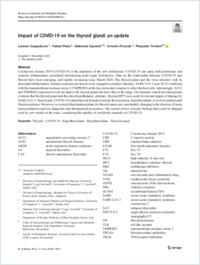Impact of COVID-19 on the thyroid gland : an update
- Scappaticcio, Lorenzo Division of Endocrinology and Metabolic Diseases, University Hospital “Luigi Vanvitelli”, University of Campania “L. Vanvitelli”, Naples, Italy
- Pitoia, Fabián Division of Endocrinology, Hospital de Clínicas, University of Buenos Aires, Buenos Aires, Argentina
- Esposito, Katherine Department of Advanced Medical and Surgical Sciences, University of Campania “L. Vanvitelli”, Naples, Italy - Diabetes Unit, University Hospital “Luigi Vanvitelli”, University of Campania “L. Vanvitelli”, Naples, Italy
- Piccardo, Arnoldo Department of Nuclear Medicine, Galliera Hospital, Genoa, Italy
- Trimboli, Pierpaolo Clinic of Endocrinology and Diabetology, Lugano and Mendrisio Regional Hospital, Ente Ospedaliero Cantonale, Bellinzona, Switzerland - Faculty of Biomedical Sciences, Università della Svizzera Italiana, Svizzera
-
2020
Published in:
- Reviews in Endocrine and Metabolic Disorders. - Springer. - 2021, vol. 22, p. 803–815
English
Coronavirus disease 2019 (COVID-19) is the pandemic of the new millennium. COVID-19 can cause both pulmonary and systemic inflammation, potentially determining multi-organ dysfunction. Data on the relationship between COVID-19 and thyroid have been emerging, and rapidly increasing since March 2020. The thyroid gland and the virus infection with its associated inflammatory-immune responses are known to be engaged in complex interplay. SARS-CoV-2 uses ACE2 combined with the transmembrane protease serine 2 (TMPRSS2) as the key molecular complex to infect the host cells. Interestingly, ACE2 and TMPRSS2 expression levels are high in the thyroid gland and more than in the lungs. Our literature search provided greater evidence that the thyroid gland and the entire hypothalamic–pituitary–thyroid (HPT) axis could be relevant targets of damage by SARS-CoV-2. Specifically, COVID-19-related thyroid disorders include thyrotoxicosis, hypothyroidism, aswell as nonthyroidal illness syndrome. Moreover, we noticed that treatment plans for thyroid cancer are considerably changing in the direction of more teleconsultations and less diagnostic and therapeutical procedures. The current review includes findings that could be changed soon by new results on the topic, considering the rapidity of worldwide research on COVID-19.
- Language
-
- English
- Classification
- Medicine
- License
- Open access status
- hybrid
- Identifiers
-
- RERO DOC 333619
- DOI 10.1007/s11154-020-09615-z
- ARK ark:/12658/srd1319385
- Persistent URL
- https://n2t.net/ark:/12658/srd1319385
Statistics
Document views: 259
File downloads:
- Texte intégral: 396
